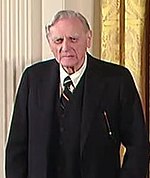John B. Goodenough, Date of Birth, Place of Birth
TweetJohn B. Goodenough
American solid-state physicist and professor
 Date of Birth: 25-Jul-1922
Date of Birth: 25-Jul-1922
 Place of Birth: Jena, Thuringia, Germany
Place of Birth: Jena, Thuringia, Germany
Profession: engineer, physicist, inventor
Nationality: United States
Zodiac Sign: Leo 
About John B. Goodenough
- John Bannister Goodenough ( GUUD-in-uf; born July 25, 1922) is an American materials scientist, a solid-state physicist, and a Nobel laureate in chemistry.
- He is a professor of mechanical engineering and materials science at the University of Texas at Austin.
- He is widely credited with the identification and development of the lithium-ion battery, for developing the Goodenough–Kanamori rules in determining the sign of the magnetic superexchange in materials, and for seminal developments in computer random access memory. Goodenough was born in Jena, Germany, to American parents.
- During and after graduating from Yale University, Goodenough served as a U.S.
- military meteorologist in World War II.
- He went on to obtain his Ph.D.
- in physics at the University of Chicago, became a researcher at MIT Lincoln Laboratory, and later the head of the Inorganic Chemistry Laboratory at the University of Oxford.
- Since 1986, he has been a professor in the school of engineering at UT Austin.
- He has been awarded the National Medal of Science, the Copley Medal, the Fermi Award, the Draper Prize, and the Japan Prize.
- The John B Goodenough Award in materials science is named for him.
- In 2019, he was awarded the Nobel Prize in Chemistry, and, at 97 years old, became the oldest Nobel laureate in history.
Read more at Wikipedia
See Also
- Famous People's Birthdays on 25 July, Germany
- Famous People's Birthdays in July, Germany
- Famous People's Birthdays on 25 July, United States
- Famous People's Birthdays in July, United States
- Famous engineer's Birthdays on 25 July, Germany
- Famous engineer's Birthdays in July, Germany
- Famous physicist's Birthdays on 25 July, Germany
- Famous physicist's Birthdays in July, Germany
- Famous inventor's Birthdays on 25 July, Germany
- Famous inventor's Birthdays in July, Germany
- Famous engineer's Birthdays on 25 July, United States
- Famous engineer's Birthdays in July, United States
- Famous physicist's Birthdays on 25 July, United States
- Famous physicist's Birthdays in July, United States
- Famous inventor's Birthdays on 25 July, United States
- Famous inventor's Birthdays in July, United States

